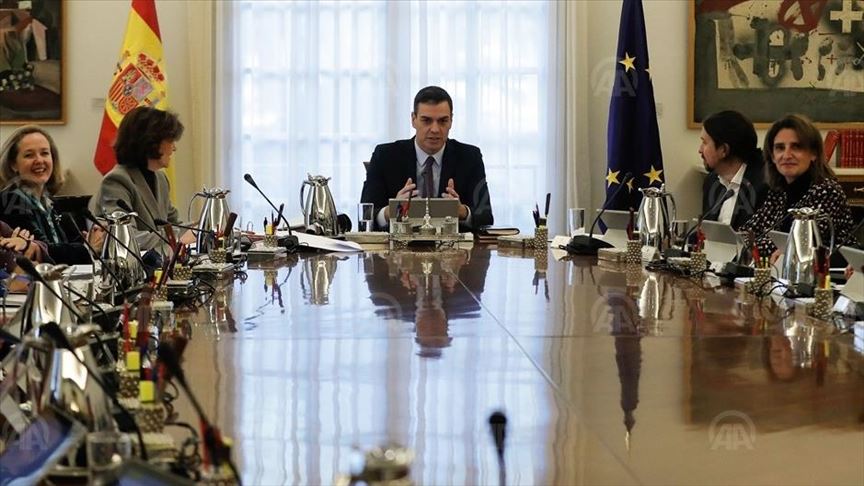
MADRID/ANKARA
After years of political turmoil, Spaniards now swing between apprehension, antagonism and, in some cases, hope.
Lawmakers appear to have settled political deadlock in the country for now, forming a coalition government woven between two left-wing parties and six smaller leftist and nationalist partners.
This "progressive" alliance, formed between the Socialist Workers' Party (PSOE) and Unidas Podemos, is widely seen as fragile and forced, and its constituent parts as disunited among themselves.
This is the first time in the history of Spain, since its transition to democracy in the late 1970s, that a coalition government was formed. It is also the first time that a prospective premier required the support of so many parties.
In addition to Unidas Podemos, Prime Minister and PSOE chief Pedro Sanchez has had to resort to the Basque Nationalist Party, More Country-Commitment, New Canary Islands, the Galician Nationalist Bloc and Teruel Exists -- all small and with interests of their own -- making it all the more difficult to come to joint decisions on country-wide issues.
On Jan. 7, the coalition won with an extremely tight simple majority -- 165 politicians voted against the coalition and 167 voted in its favor. The rest of the members of the 350-seat parliament abstained.
The opposition was led by the right-wing Popular Party, as well as the parties Citizens and far-right VOX. The win was largely indebted to the negotiated abstention of the Republican Left of Catalonia party, and EH Bildu -- a Basque nationalist party that has links to the extinct ETA terrorist group.
Right-wing parties have accused the coalition government of collaborating with "separatists and terrorists", due to its agreement with these two parties.
Founded in 1959, ETA has waged an armed struggle to establish an independent Basque state in northern Spain and southwest France. It is accused of killing at least 800 people and kidnapping dozens of others.
A week after the crucial victory, the PSOE announced the formation of a 22-member cabinet with 17 of its own members and five from Unidas Podemos.
Watching your back
The formation of the coalition is critical in stabilizing the country, as well as building a positive image in the eyes of the EU and international bodies such as the World Trade Organization and establishing a clear leadership in government.
In what some see as an attempt to dilute the influence of Unidas Podemos chief Pablo Iglesias, who negotiated from the beginning to become vice president for social rights and the 2030 agenda, Sanchez secured the three other vice presidential posts.
The vice presidents of coalition government, chaired by Sanchez, will be Pablo Iglesias, Carmen Calvo, Nadia Calvino and Teresa Ribera.
For the first time in history, the country will have three female vice presidents.
The alliance opened the door for Podemos to occupy key portfolios including the Ministry of Equality, which will be managed by Irene Montero, as well as the ministries of labor, consumption and universities.
The division reveals a key feature of this symbiosis, being that more technical profiles that bear more international weight such as the economy and climate change -- a political priority in Europe -- as well as the ministries of defense, justice, interior and foreign affairs will continue to be run by the PSOE, while social issues will be tasked to Podemos, a new-comer in government.
Cohesion or shipwreck
In the country's new legislature, three major issues occupy the agenda: the economy, environment and still-unresolved issue of Catalonia and environmental issues.
For the new government to work, the coexistence between Sanchez and Iglesias must be congruent and coherent, and the leaders must -- at least temporarily -- abandon their theatrical rivalries that have become customary in Spanish politics.
On the other hand, it is imperative that left-wing lawmakers remain loyal to their parties in order to uphold the viability of their government, and in this case the uncomfortable conversations that are pending with Catalan independence will be relevant and on which a gigantic social and political pressure.
In addition to all this, the nascent government will face a vehement right-wing opposition.
Amid all this uncertainty, the expectations that Spaniards have for this government are low, as is its likelihood of staying together.
Four years of failure
In late July last year, days before Sanchez's minority government lost parliamentary confidence votes triggering snap elections, the Sanchez rejected a last minute offer by Podemos on forming the government, due to disagreement on which party would receive the labor portfolio, which Podemos demanded in return for his support.
Sanchez also closed the doors to possible negotiation on a referendum with Catalan nationalist parties, ruling out a referendum of any "action and dialogue".
However this time around, he found common ground with both groups, giving Labor Ministry to Podemos and softening his rhetoric on the issue of Catalonia, saying it was a problem that should be resolved through dialogue.
Spain's political system, which was based on two major parties -- the right-wing Popular Party and the PSOE, collapsed after the 2008-2014 economic crisis, forcing the parties to seek support from the smaller parties that gained popularity in order to form minority governments.
As a result of the economic crisis, the presence of new parties such as Podemos and the Citizens party had caused the Popular Party and PSOE to lose votes. Since 2015, no party has been able to gain the majority necessary to form a government, which has led the country to hold the fourth general elections in four years.


